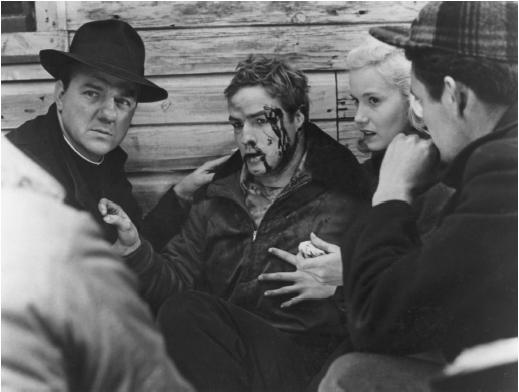
I watched On the Waterfront because it was a classic I'd never seen, an eruption of Marlon Brando, a famous monologue. When the film ended, I immediately wondered how such a well-regarded film could be so thin.
Terry Malloy's romance with Edie (Eva Marie Saint) is fairly preposterous. Who really buys her affection for the man who precipitated her brother's death? She has no qualms about Terry subsequently taking over her brother's pigeons--she seems more attracted to him because of it.
Supporting actors Lee J. Cobb and Karl Malden are strenuous as the opposing forces of mob boss and priest. They would be better off if they went fully in to caricature, though Cobb’s over the top monologues are subtle next to Malden’s repeated preaching about Jesus on the Cross on the Docks on the Waterfront. From the cargo hold of a ship carrying Irish whiskey, we even the see the ascension on an empty pallet.

The cinematography is widely praised; I see lots of fences and chicken wire but not much sense of a city or busy shipyard. I mean, I'd like to see what Hoboken, New Jersey looked like 55 years ago but the film might as well have been shot on a backlot.
Furthermore, the climax of On the Waterfront is unmotivated. There’s no reason for Charley Malloy’s murder. Not only is he "the brains" of the operation, you need him alive to ensure Terry's cooperation. Killing a guy's brother can only push him into the arms of the police. I think it was more important to the filmmakers to obviate the symbolism of the hook and make Brando wail (something at which he does excel).
I'm more interested in off screen realities when it comes to On the Waterfront. Director Elia Kazan made a movie about the virtue of informing on friends for the greater good after he gave the HUAC names of communists in the film industry. That leaves a sour taste in one's mouth. But! It is one of the Vatican's top 45 films of all time. And I can't take that away.

I saw Tyson as soon as I got the chance--it's nothing but the man himself and more powerful for it. In the style of The Kid Stays in the Picture, James Toback lets Tyson pump himself up and then try to explain his excruciating fall. I'm a big believer in the documentary with minimal narration. A film like Tarnation is a great example of how over-explanation can poison narrative momentum. Jonathan Caouette had tremendous, gripping footage but his need to make sure everyone "got it" bogged down what could have been a classic.
Tyson spits out many great lines and I can only remember a fraction--one that I liked particularly was (approximately), “I am an extremist. People hate me because they can’t understand me.” This is insightful commentary on why people hate all sorts of people, not just Mike Tyson.

My favorite sequences centered around Evander Holyfield and Robin Givens, two very different nemeses. Tyson's take on the two more-or-less career-ending Holyfield fights focus on the alleged headbutting by the guy who has even more children and brain damage than Mike. The replays are selective, but it sure looks like the "Real Deal" tries to open those cuts by any means necessary. Some of my earliest SportsCenter memories are from that Sunday morning where we heard nothing but anchors shrieking about Tyson biting off Holyfield's ear. It's revealing to learn how Tyson felt he was really trying to save his life in those moments. Somehow, I had never seen Robin Givens complete psychological dismantling of Tyson on Barbara Walters (Bawbwa's fearful glances at Tyson throughout are priceless). It turns out that you could subdue the baddest man alive by calling him an abusive manic depressive on national television.
And the film is worth seeing just for the big screen archival footage of young Tyson. His electric speed and power is one thing, but it is the look of fear—however brief—in his opponents’ eyes that I can’t get over. These are men who have fought all their lives and Tyson still had them beat before the bout even started.
 (Down goes Berbick, in a sheer panic, months after beating Muhammad Ali.)
(Down goes Berbick, in a sheer panic, months after beating Muhammad Ali.)A little more detail on exactly how the money went away (though a line about Tyson's settlement with Don King was telling, something like, “I got nothing, twenty or thirty million”) would have been useful. I remember reading once about six figure monthly expenditures for upkeep of his lions, tigers and parrots.
So I’m left asking why it turned out the way it did even after watching 90 minutes of Tyson. But now I know he is asking the same thing.
And here's one thing I can say about On the Waterfront: Brando's eyes look right.




No comments:
Post a Comment